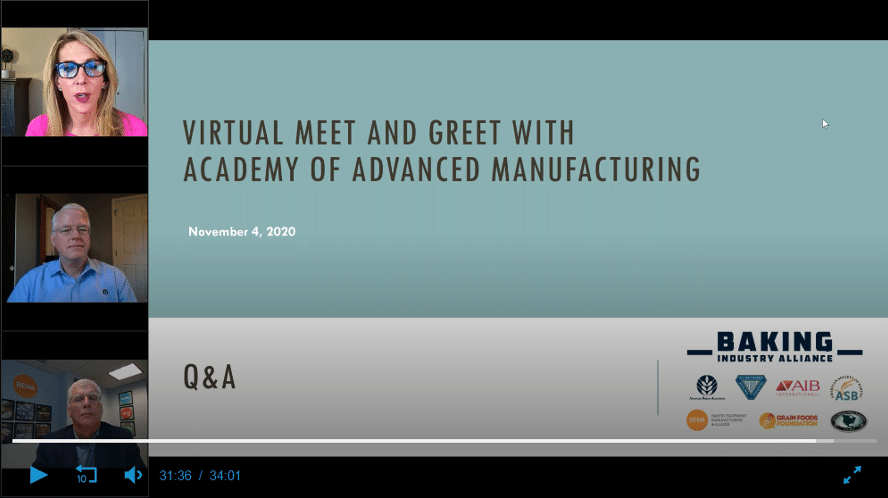On November 11, the United States honors the approximately 18 million men and women who have bravely served our country. Following their service, many of the more than 200,000 service members who transition out of the military each year find themselves looking to reconnect in a civilian world. Despite being trained as leaders and possessing a strong work ethic, a growing number of veterans face difficulty finding civilian employment with close to 1 million unemployed military veterans across the United States.
Recognizing the surplus of untapped military talent with prior technical skills, Rockwell Automation, a provider of industrial automation solutions, and its partner ManpowerGroup, a leader in innovative workforce solutions, teamed up to create the Academy of Advanced Manufacturing (AAM) in 2017. In doing so, the Milwaukee-based companies created a pipeline for their clients and partners to hire skilled workers while giving back to the veterans who have served and protected.
Advancing from concept to realization in less than a year, the Academy recruits and upskills veterans with prior technical skills for its unique 12-week, full-time intensive training program. With locations in Cleveland and Milwaukee, the AAM is bridging the skills gap for manufacturers in multiple industries and developing the next generation for fluency in manufacturing automation and control.
In the face of economic and marketplace changes, such action is necessary as an estimated 2.4 million jobs in the United States will go unfulfilled by 2028, according to the Deloitte 2018 Skills Gap in Manufacturing Study. Coupled with the 22 percent of manufacturing workers who will retire in the next six years, the situation needs a solution. While executives agree there is a talent shortage, many companies lack the skills and overhead needed to source, recruit, assess, select, and develop individuals within the veteran workforces.
“The 12-week training program is unique and solves a problem from an industrial level,” said Mary Burgoon, Business Development Manager for the AAM at Rockwell Automation. “While it’s possible for companies to go through schools and recruit, the Academy is able to plug the holes in a short amount of time.”
While veterans bring with them teamwork, initiative and a strong work ethic, it’s also important to understand the differences between military and civilian work environments. Dave Mayewski, a former veteran and Regional Industry Sales Manager at Rockwell Automation, shared that veterans come from a chain of command environment where immediate and candid feedback is always shared. Because these individuals have experienced serious situations, outside the realm of most civilians, they seek out a sense of purpose and a commitment to work until the mission is accomplished.
Looking to bridge the best of two worlds, AAM offers veterans training that combines technical and professional competencies. The intensive and immersive program of industry- and vendor-agnostic training is 40 percent instructor-led classroom learning and 60 percent hands-on lab experience. The process leverages the knowledge of Rockwell Automation employees, some of whom are also returning veterans. Acknowledging each veteran’s core capabilities, AAM students learn the language of industry, automation and advanced manufacturing.
AAM’s technical courses include industrial automation principles, controllers, networks visualization, AC drives/motors, instrumentation and machine safety. Students also learn professional competencies such as accelerating team performance, communications, navigating change, managing conflict and presentation skills. AAM veteran participants receive a salary, housing and meals throughout their schooling and are not required to use their GI Bill.
Upon graduation, students are work-ready from day one and hit the ground running, even in the hard-to-fill technician level roles. With multiple cohorts held throughout the year, participating manufacturers have the opportunity to interview candidates for roles within their organization.
To date, the AAM has trained more than 170 graduates in 10 cohorts with more than 80 percent of graduates placed in a career-advancing job. Companies such as Cargill, Georgia-Pacific, Nestlé, Owens Corning, USS, U.S. Steel, USG, and Tyson have worked with the Academy to fulfill roles for controls technician, maintenance technician, electro-mechanical technician and maintenance supervisor. Salaries for graduates typically range from $55,000-$60,000 with an hourly rate of $25-$28. The AAM offers a 6-month guarantee upon placement, and there is fee to the participant to defray investment.
Post-graduation AAM continues to refine its program offerings through 30-, 60- and 90-day check-ins with students and employers. Students also receive continued support with access to an e-learning catalog of Rockwell technology, and they remain in contact with their coaches and receive mentoring from a Rockwell salesperson. In 2021, AAM plans to run six classes.
The Baking Industry Alliance (BIA) is proud to partner with AAM as a resource to address the challenge of recruiting skilled manufacturing workers to the industry. BIA also works with USO Pathfinder, a transition program, to build interview skills among military service members and their spouses and share how military skill sets can transfer to the wholesale baking industry.

“From both a supplier and a baker standpoint, we need to be on the lookout to improve how we acquire and train talent for the future of the industry,” said Kerwin Brown, BEMA President and CEO. “BEMA is proud to support these important efforts, and we will continue to promote the work of AAM to our members and to the baking industry because of our belief in and commitment to such an important cause.”
To learn more about the AAM program, email aam@rockwell.com.
Click here to watch a replay of the Nov. 4 Virtual Meet and Greet with ABA, BEMA and AAM.
(Fill out the registration form in order to watch the video instantly.)


